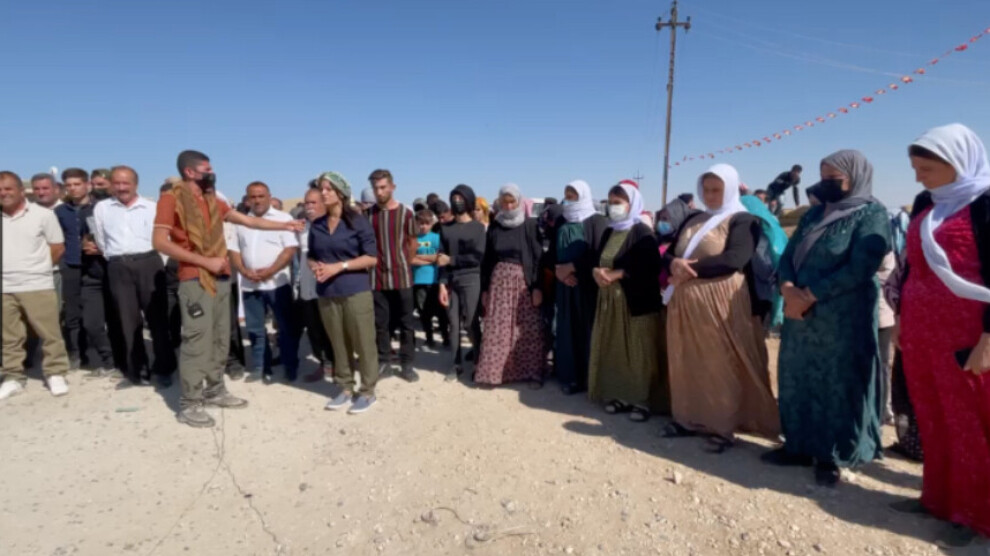The Democratic Autonomous Council of Shengal (MXDŞ) has released a leaflet with the timeline of a year of “Pain and Resistance” as they called the struggle the Yazidi community had to wage both against the pressure of Baghdad and Erbil.
After the rise of ISIS in 2014, the whole Middle East was faced with brutal attacks and massacres. The aim of ISIS was to destroy the social fabric and history of all communities living in the region and to commit genocide against those it deemed infidels. The Ezidi community, which was completely unprotected at the time, suffered the most from the inhumane ideology and brutal acts carried out by ISIS.
The MXDŞ underlined that “the forces that were responsible for the protection of Sinjar [Shengal], that is, the Iraqi central government and KDP military forces, fled immediately after the start of ISIS attacks on 3 August 2014. Thus, both forces did not only pave the way for the slaughter, capture and rape of tens of thousands of Yazidis, but also urged them not to resist. A number of Yazidi civilians nevertheless insisted on defending their homeland. With the help of a small groups of PKK guerrillas who rushed to their help under the most difficult circumstances after the brutal IS attacks became public, a `corridor of survival` was opened. This allowed hundreds of thousands of Yazidis to escape from Mount Sinjar to Rojava. After ISIS took thousands of Yazidi women as sex slaves and killed young and old men in Sinjar`s villages, the international community assisted the small group of PKK guerrillas and the locals who were resisting against ISIS.”
Sinjar has since become a safe place for its population which governs itself with the help of a variety of social, cultural, political and economic institutions. While the Yazidi people were hoping for more support and recognition for their self-administration from the central Iraqi government and the KRG (Kurdistan Regional Government), these forces instead signed a deal on the future of Sinjar on 9 October 2020 without consulting the local population. “This deal – said the MXDŞ - does not serve the interests of the Yazidi people. On the contrary, it not only seeks to completely destroy their free will and fundamental rights, but to return the very forces to Sinjar that paved the way for the Yazidi genocide committed by ISIS.”
UNAMI has expressed its support for the Bagdad-Erbil-Deal regarding three main points, i.e. the return of refugees, security and stability in the region and the reconstruction of Sinjar. But, in reality, said the MXDŞ “it is not the population and self-administration of Sinjar that are preventing these three goals. On the contrary, they have always made these three issues their main demands.” The KDP prevents the more than 200.000 Yazidi refugees who are still living in South Kurdish camps to go back to Shengal.
The MXDŞ underlined that sadly “the efforts and calls of Sinjar`s Yazidi, Arab, Christian, Shia and Sunni population as well as the Democratic Autonomous Council of Sinjar, has not led to any major results yet. We witnessed the latest example of refusal to respect the free will of Sinjar`s population during the general elections in Iraq on 10 October 2021. The KDP manipulated the election results in Sinjar for its own benefits. This election fraud was committed by the KDP with the help of the electronic voting devices.”
The MXDŞ representatives have since declared that they will not accept this election fraud and will continue to represent the interests of Sinjar`s population, while at the same time remaining open for negotiating a new deal with the participation of all relevant actors.
The MXDŞ has submitted the following demands to the Iraqi central government, UNAMI representatives and the members of the International Coalition Against ISIS:
“1. establishment of a no-fly-zone over Sinjar,
2. condemn and reject against the Bagdad-Erbil-Deal,
3. support the negotiation of a new, comprehensive deal that takes into account the interests of all related parties,
4. official recognition of the social, political and democratic self-administration of Sinjar,
5. official recognition of the self-defense forces YBŞ and YJŞ and the Êzidxan Asayiş as
the legitimate security forces of Sinjar,
6. national and international prosecution of the perpetrators, instigators, assistants
and supporters of the genocide/femicide committed against the Yazidi population of
Sinjar, especially the KDP, Turkey and ISIS,
7. material and financial support for the re-construction of Sinjar.”














